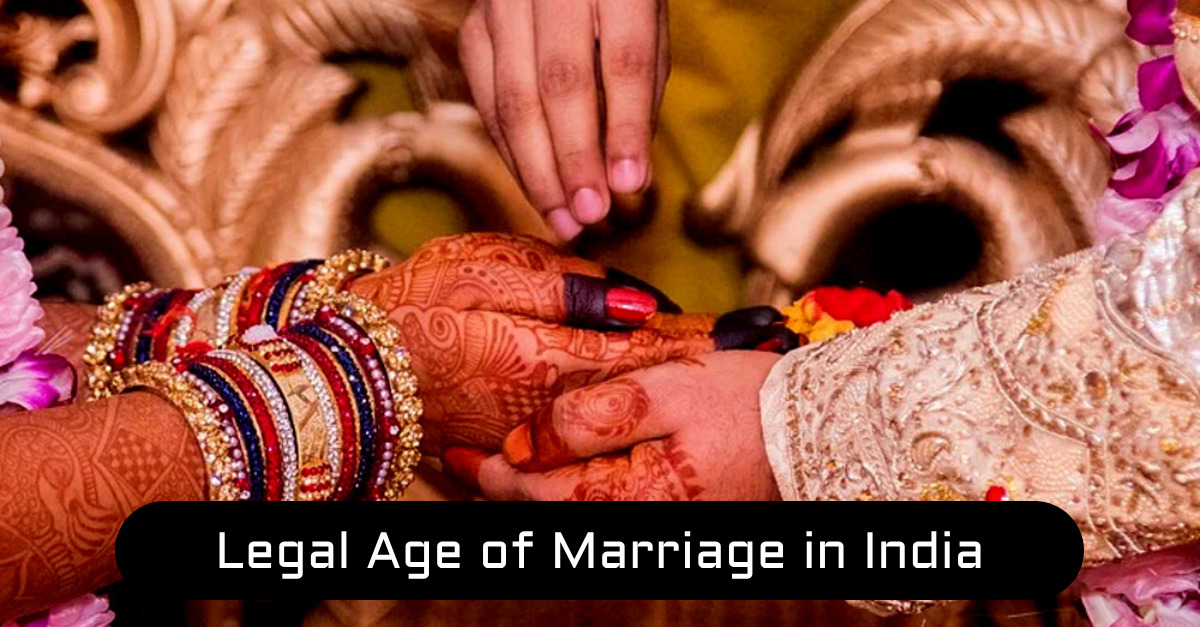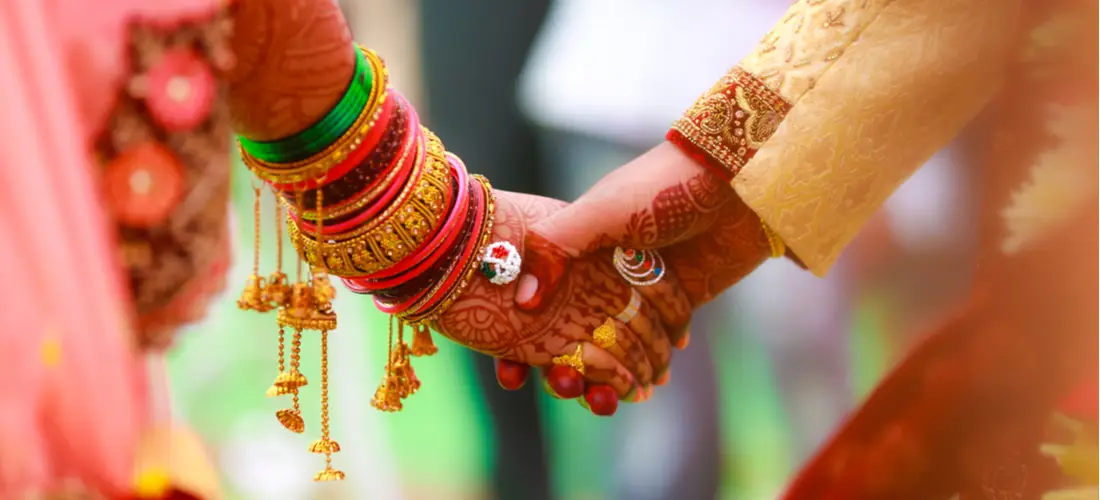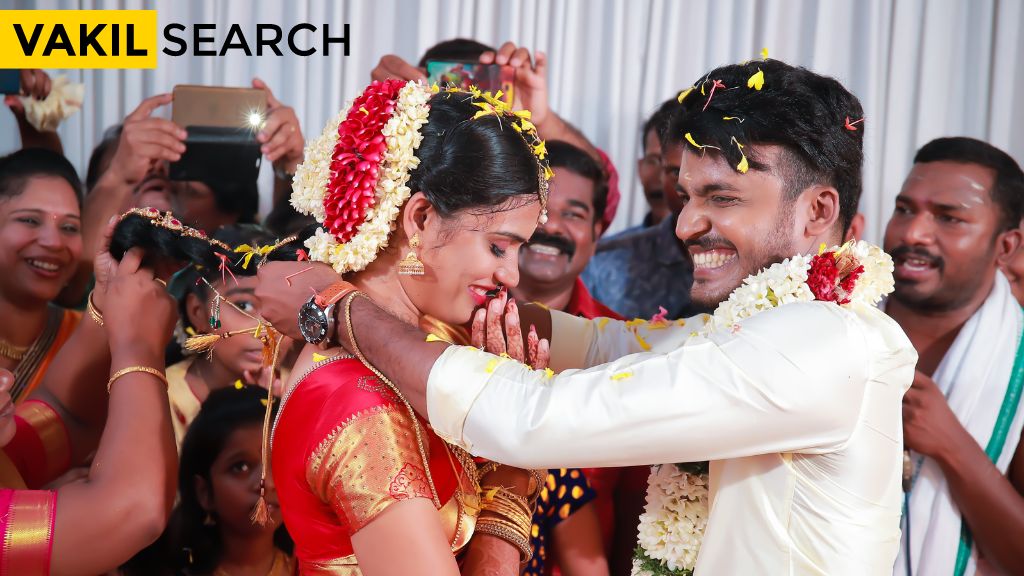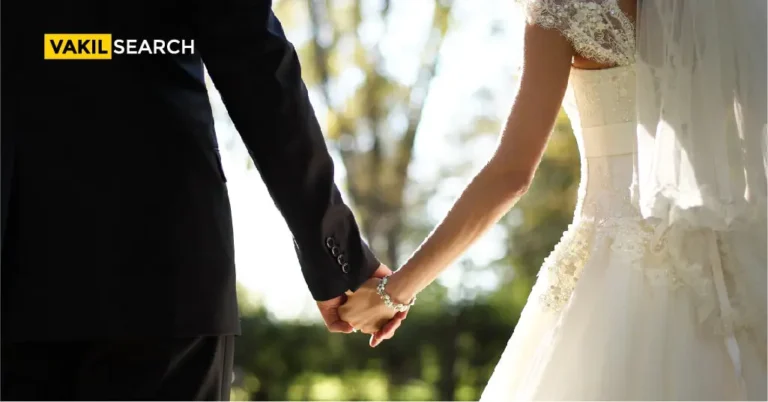In India, marriage is a vital social institution, and one essential feature that is managed by laws and regulations is the legal age of marriage. Marriage age in india for girl and boy must adhere to the same rules and limitations regarding India's legal marriage age. For help with the many legal issues related to marriage age in India, contact Vakilsearch for professional legal advice.
The legal age of marriage in India is a complex and often debated topic, with implications for individual rights, social development, and gender equality. Understanding the current regulations and potential changes is crucial for informed decisions and discussions in 2024. The legal age of marriage in India is governed by the Prohibition of Child Marriage Act (PCMA), 2006, which sets the marriage age in India for girls and boys in 2024.
The concept of a legal marriage age in India has evolved through various legislative acts, each aiming to balance tradition with protecting individuals’ well-being. Here’s a breakdown of the key points:
Historically
- The Hindu Marriage Act of 1955 established the minimum age for marriage at 18 for girls and 21 for boys.
- The Special Marriage Act of 1954 echoed this age requirement.
- The Child Marriage Restraint Act (1929) and its successor, the Prohibition of Child Marriage Act (2006), aimed to prevent marriages before this age of maturity.
Current Situation
- While 18 remains the legal age for girls, the government is proposing to raise it to 21, aligning it with boys.
- This proposal sparks debate, raising questions about gender equality, cultural sensitivity, and potential social impacts.
Looking Ahead
- The proposed amendment awaits parliamentary approval to become law.
- Regardless of the final age, individual maturity and open communication remain crucial for a healthy marriage.
- Staying informed about legal updates and seeking legal guidance ensure informed decisions and safeguard individual rights.
Why the Age Gap?
The rationale behind the age difference stems from several factors:
Maturity and Consent
- Boys are generally considered to attain emotional and financial maturity later than girls. The 21-year minimum aims to ensure boys are better equipped to handle the responsibilities of marriage and parenthood.
- Health Concerns: Early pregnancy for young girls poses significant health risks, both for the mother and child. Setting the age at 18 aims to protect their physical well-being.
- Education and Empowerment: Allowing girls to pursue education and careers beyond 18 empowers them to make informed choices about marriage and reduces societal pressure for early wedlock.
The Debate for Equalization
Despite the reasoning behind the age gap, a strong argument exists for equalizing the minimum marriage age at 21 for both genders. Proponents argue:
Gender Equality
- The current law reinforces gender stereotypes and potentially discriminates against girls by restricting their autonomy.
- Uniformity and Consistency: Equalizing the age sends a clear message that both men and women deserve equal opportunities for education, career development, and personal growth before marriage.
- Addressing Child Marriage: The disparity might create loopholes, potentially leading to marrying girls off before 21 under certain personal laws or customs.
The Road Ahead
The government of India has been actively considering raising the minimum marriage age for girls to 21. In 2020, a committee recommended this change, highlighting its potential to empower women and improve social and economic outcomes. However, the proposal faces challenges:
Social and Religious Resistance
- Certain communities might oppose the change, citing cultural and religious traditions that prefer early marriage for girls.
- Logistical Considerations: Implementing such a change requires extensive awareness campaigns and addressing potential legal complexities.
India’s legal landscape regarding marriage age is complex and varies depending on personal laws, religion, and proposed reforms.
For Women
Most personal laws and the Special Marriage Act, 1954, stipulate a minimum age of 18 for marriage. This applies to all women, regardless of religion.
However, personal laws for certain communities, including some Muslim communities, may still have provisions based on attaining puberty. This raises concerns about child marriage and gender equality, as puberty can occur at different ages, potentially leading to underage marriages.
A proposal to raise the minimum marriage age for all women to 21 is currently under consideration. This aims to promote gender equality, educational opportunities, and physical and mental maturity for women before marriage.
For Men
The legal marriage age for men is currently 21, regardless of religion.
The rationale behind this difference often cites the financial responsibility of husbands, although this generalization can be harmful and overlooks the changing dynamics of marriage and gender roles.
Note:
Child marriage, regardless of gender or religion, is illegal in India. The Prohibition of Child Marriage Act, 2006, sets the minimum age for marriage at 18 for all individuals.
The practice of determining marriage age solely based on attaining puberty is not legally recognized and poses serious risks to children.
It’s crucial to rely on accurate and up-to-date legal information to understand and advocate for individual rights and equality within the complex landscape of marriage age in India.
Legal Age of Marriage in India: Best Age to Get Married According to Science
While science offers insights into marriage, it doesn’t provide a definitive “best age” to get married. Different studies highlight various factors that contribute to marital success, making it a complex and individual matter. Here’s what science tells us:
Factors Linked to Marital Success
- Age: Studies suggest that waiting until your late 20s or early 30s might be associated with a lower risk of divorce. This coincides with increased maturity, financial stability, and clearer life goals. However, this isn’t a guarantee and plenty of happy marriages occur at different ages.
- Education and income: Higher education and income levels are often linked to lower divorce rates, potentially due to better communication skills, shared goals, and reduced financial stress.
- Emotional maturity: Self-awareness, the ability to manage emotions, and effective communication are crucial for navigating challenges and building a strong partnership.
- Relationship quality: Strong premarital relationships with healthy communication, shared values, and realistic expectations are key predictors of marital success.
Limitations of Research
- Correlation does not equal causation: Age, education, or income might correlate with marital success, but they don’t necessarily cause it. Other factors like individual personalities and relationship dynamics play a significant role.
- Focus on averages: Studies analyze large datasets, offering insights into trends but not individual predictions. Your unique circumstances and relationship dynamics are crucial considerations.
- Marriage is a personal decision: There’s no one-size-fits-all answer, and the best age depends on your circumstances, maturity, and relationship readiness.
- Focus on building a strong foundation: Invest in personal growth, emotional intelligence, and open communication within your relationship.
- Seek professional guidance: Relationship therapists or premarital counseling can offer valuable insights and support.
Conclusion
The Prohibition of Child Marriage Act (PCMA), 2006 states that the legal age of marriage in India would be 18 for females and 21 for boys by 2023. To avoid child marriage and protect people’s rights and well-being, it is essential to adhere to the legal marriage age in India. Making educated selections about marriage can also be aided by taking into account aspects like one’s mental, physical, and financial preparation as well as by seeking professional legal counsel from agencies like Vakilsearch. It is crucial to raise awareness about child marriage, support initiatives to do so, and make sure people marry at an appropriate age while protecting their rights and well-being.










